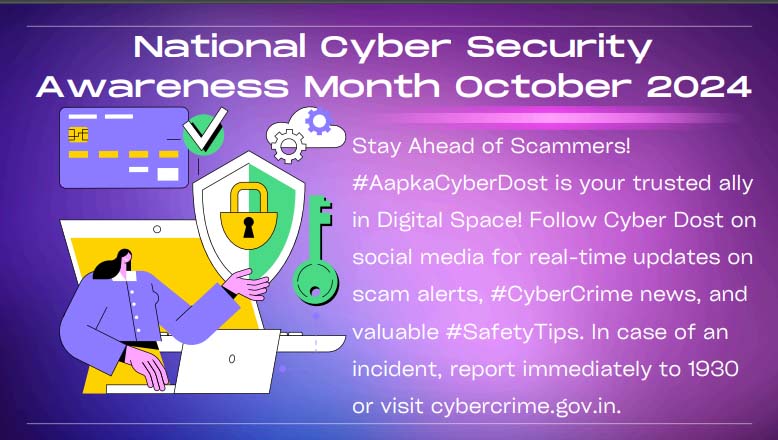National Cyber Security Awareness Month October 2024'
Stay Ahead of Scammers!
Follow Cyber Dost on social media for real-time updates on scam alerts, For CyberCrime news, and For valuable SafetyTips. In case of an incident, report immediately to 1930 or visit cybercrime.gov.in.
Lock up cyber threats, not your freedom! On the first Wednesday of every month we celebrate Cyber Jagrukta Diwas – an important initiative that promotes online security, cybercrime prevention and understanding of digital security. Let’s make our digital life safe and strong together.

Please Follow Cyber Safety Tips
Never share personal details or pay upfront fees for fake lottery claims. Stay alert and protect yourself from fraud!
Be cautious of online job fake offers like Work from Home, Click & Earn, Rate & Earn. Always verify before sharing your financial or personal details. Stay safe online!
“Beware of Parcel Scams: Protect Yourself from Fraud! NEVER pay unexpected fees or provide personal details for a parcel you were not expecting.”
“Stay Smart, Stay Safe – Don’t Fall for Fake Trading Apps.Verify Before You Invest – Protect Your Hard-Earned Money.Scammers Are Everywhere, Keep Your Guard Up.Choose Trusted Platforms, Not Risky Shortcuts!”
Beware of Cyber Stalking Scams – Protect your online presence and safeguard your identity.
Think twice before sharing personal details with strangers. Your vigilance is the key to staying safe online.”
Beware of Fake Loan Apps! Don’t fall for scams that promise easy money but steal your data and hard-earned cash.
Chatting with strangers can be a trap,One wrong move, and you’ll fall in the gap. Be cautious and wise, keep your data tight,Stay vigilant online, and you’ll be alright.”
“Beware of lottery scams! Never share your personal info with strangers.
Stay alert and protect yourself from fraud!”
“Stay cautious on online dating apps! Not everyone is who they claim to be. Protect your privacy, verify profiles, and trust your instincts. Your safety comes first!”
Update yourself with the latest cyber news.
For any Cyber Crime complaint report to : https://cybercrime.gov.in
October is National Cyber Security Awareness Month (NCSAM), a perfect opportunity to emphasize the importance of cyber safety and online security.
Cyber Safety Tips
- Use strong, unique passwords and consider password managers.
- Enable two-factor authentication (2FA) whenever possible.
- Keep software and operating systems up-to-date.
- Be cautious with emails, attachments, and links from unknown sources.
- Use reputable antivirus software and regularly scan devices.
- Use a virtual private network (VPN) on public Wi-Fi.
- Regularly back up important data.
- Monitor accounts and credit reports for suspicious activity.
- Use secure websites (HTTPS) and avoid public computers for sensitive activities.
- Educate yourself on online threats and best practices.
Online Safety Guidelines
- Verify online identities and profiles.
- Avoid sharing sensitive information online.
- Set social media accounts to private.
- Use encryption for sensitive data.
- Report suspicious activity to authorities.
Let’s work together to promote cyber safety and online security!
FAQs
General Cyber Security FAQs
Cyber security refers to the practices, technologies, and processes designed to protect digital information, networks, and devices from unauthorized access, use, disclosure, disruption, modification, or destruction.
Cyber security is crucial because it protects sensitive information, prevents financial loss, maintains privacy, and ensures the integrity of digital systems.
Common cyber threats include malware, phishing, ransomware, SQL injection, cross-site scripting (XSS), and denial-of-service (DoS) attacks
Protect yourself by using strong passwords, enabling two-factor authentication, keeping software up-to-date, being cautious with emails and links, and using reputable antivirus software.
What is the difference between a virus and malware?
Password and Authentication FAQs
Strong passwords prevent unauthorized access to accounts and protect sensitive information.
Use a combination of uppercase and lowercase letters, numbers, and special characters, and aim for a minimum of 12 characters.
2FA adds an extra layer of security by requiring a second form of verification, such as a code sent to a phone or a biometric scan.
2FA works by requiring a user to provide two forms of verification: something they know (password) and something they have (phone or token).
What is the difference between a virus and malware?
What is the difference between a virus and malware?
Email and Phishing FAQs
Phishing is a social engineering attack that tricks users into revealing sensitive information or clicking malicious links
Look for suspicious sender addresses, spelling mistakes, and urgent or threatening language.
Report the email to the relevant authority and delete it without clicking any links.
Be cautious with links and attachments, verify sender identities, and use spam filters.
Spam filtering uses algorithms to detect and block unwanted or malicious emails.
Social Media and Online Safety FAQs
Use strong passwords, enable 2FA, and be cautious with friend requests.
Report the incident to the platform, change passwords, and monitor account activity.
Block or report abusive users, use privacy settings, and document incidents.
Monitor online activity, set parental controls, and educate children on online safety.
Contact the platform, local authorities, or national hotlines

